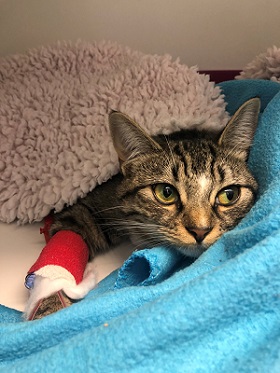The Value of the Transfusion Medicine Service
Clinical Connections – Autumn 2021
Charlotte Russo, Head Transfusion Medicine RVN
Anaemia, blood loss and transfusion dependant conditions are sadly not uncommon in veterinary medicine. They can be devastating for pets, owners, and the veterinary staff treating them. There is only one commercial canine blood bank in the UK, so demand from a busy centre like the Queen Mother Hospital for Animals (QMHA) would deplete their supply, jeopardising other practices' ability to obtain products.
The RVC blood donor programme started in early 2000s, performing donations from some staff-owned dogs and cats and visiting local practices to run blood drives. The current programme is significantly different – we are now a dedicated Transfusion Medicine Service, consisting of eight team members and over 160 dogs and more than 50 cats on the programme. We perform donations every day, helping to produce products for transfusion but also creating more specialised products like serum eye drops for ophthalmic patients.
We are now one of the busiest veterinary transfusion services in the world and the only place in the UK to collect and store feline blood products. We perform 500-800 blood transfusions a year, helping to save the lives of hundreds of pets.
This year we sadly had many cats desperately needing blood transfusions due to a spike in pancytopenia cases. Such patients are at high infection risk, can be anaemic and are prone to bleeding. Due to the severity of this illness, the facilities and expertise of our ECC and Internal Medicine Services and our blood donor programme having the largest feline blood donor service in the UK, a significant number of cats were referred to the QMHA.

Mia came to us in July when she was 11 months old after being lethargic at home and her owners noticed she was bleeding from her mouth. After a few tests she was quickly diagnosed as being pancytopenic. Two weeks into her three-week stay with us, her red cell count took a further drop to levels where she could no longer cope without a transfusion. Luckily for Mia, one of our amazing blood donors, Jack Jack, had donated blood for the hospital six days earlier and his unit was ready for her to receive.
It was Jack Jack’s seventh blood donation, and he takes everything in his stride, purring most of the time he’s with us and he loves all the fuss and treats he gets when he comes in. Mia was able to go home five days later and at a check-up two months later her blood cell levels were all almost back to normal. When updating us, her owner said: “She is back to her playful mischievous self, without the help of a feline blood donor I believe Mia might not have had the chance to survive, like so many others that have fallen victim to a dreadful illness.”
Most years we provide around 60 feline blood transfusions, this year we have already delivered over 100 transfusions to cats, along with over 430 canine blood product transfusions for dogs like Lola.
Lola needed the help of the transfusion service in August 2021, she was extremely unwell after suffering from sepsis following an acute episode of haemorrhagic gastroenteritis. Lola was sadly so critical that she suffered two cardiopulmonary arrests before being referred to the RVC but was thankfully able to be resuscitated. She needed emergency plasma and blood transfusions to stabilise her before arriving at the RVC and once with us she required a further blood transfusion, which was donated by Ole. This lovely German shorthaired pointer has now done three donations for the hospital. Ole signed up during the pandemic and so all his donations have been performed without his owners being present, which is even more impressive!
Our blood donor programme is always looking to recruit more heroes to help us treat patients. Please visit our website www. rvc.ac.uk/blooddonors to see if a pet fits the criteria to be a blood donor. Otherwise please contact us at blooddonor@rvc.ac.uk 01707 666511. The Transfusion Medicine Service is also always available for advice to other veterinary practices who require transfusion support.
